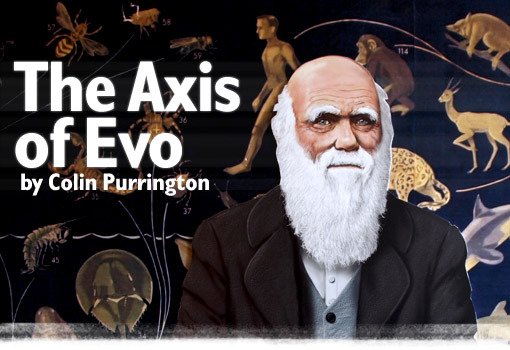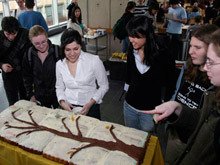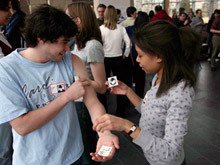The Axis of Evo


Associate Professor of Biology Colin Purrington researches parasitic dodder, a widespread and agriculturally important plant that sucks the sugar and water from its host, often killing it. Write to him at cpurrin1@swarthmore.edu
On Charles Darwin's 200th birthday, Associate Professor of Biology Colin Purrington invited the campus to a party in the Science Center. Attended by more than a hundred students, faculty, staff members, and alumni, it was the latest, and perhaps most visible, of his efforts to date on behalf of evolution education.
Because I teach evolution, I have a professional obsession with when and how people come to hate the theory. Many people suspect that there might be something immoral about accepting evolution — and that there is certainly something wrong with people who spend all day teaching the theory to children. Once, after a presentation I made about teaching evolution to young kids, another speaker (a particle physicist) pointed at me and said that asking teachers to inform elementary school kids about Darwin was a "crime against humanity." In my view, the true crime is withholding evolution instruction until high school or college.

Charles Darwin's birthday cake featured an icing tree similar to a sketch Darwin made to represent the way evolution works.
Kids — especially very young kids — are naturally interested in the origin of life, the origin of humans, and what it means to be alive. Teaching evolution to older kids just doesn't work; you have to start with toddlers.
So, several years ago, I decided that simply teaching evolution to a few thousand Swarthmore students over the life of my career wasn't going to really change public attitudes. I felt I had to do something to speed up the acceptance of evolution. This work is not going to stop global warming or make gas cheaper, but I feel strongly that science education is hobbled in part because other aspects of science are so often associated with evolution. If people accept and enjoy the science of evolution, we might have a better overall science education policy in the United States — and that would be a good thing.

The design also appeared on the many temporary tattoos Colin provided for the occasion, along with others of Darwin's face. More photos
I optimistically started a collection of pro-evolution Web pages that I collectively call my Evolution Outreach Projects, with the hope that some of them might be virally transmitted often enough to slowly influence those on the Internet who might be swayed. I often describe these projects as part of the "Axis of Evo" to make it clear that this type of endeavor is pure evil to some. But for others, I hope it is a welcome relief from the anti-science, ignorance-is-virtue culture that has become so popular in our country.
The success of Web sites is often measured in hits or sales, but for me it's the feedback I get from people who've stumbled onto the sites and consumed the content as I hoped they would. My ultimate goal is that my projects plant the idea in parents that it is possible to talk about evolution to their kids — and that the kids will love it. One person who wrote to me made it all worthwhile: "My wife is pregnant; I have bookmarked your site for when the wee one approaches me with questions about from whence we came. I know that it's a cliché, but keep up the good work."
The complete text of this article can be found in the October 2008 issue of The Bulletin.


